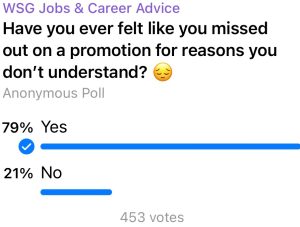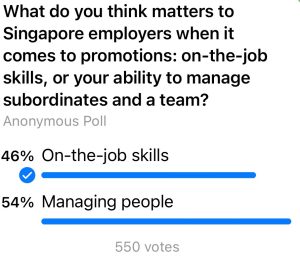- Missing out on a promotion can be frustrating- what should you do next?
- Sometimes, there may be reasons you’re not seeing about why you didn’t get promoted
- Different industries do have different promotion trends
Not getting that promotion you’ve been gunning for can be disheartening, whether or not you thought you deserved one. It gets even more frustrating because, more often than not, that promotion goes to a peer. It can lead you to wonder: what is your boss or employer thinking?
Well, that’s what this piece is for: to help you see the other side of the fence from an employer’s perspective, and to give you an action plan on what to do next (no, not throw your resignation letter at your boss’s face!).

We get the frustration, of course. A recent poll above run on our Telegram channel showed almost 80% of Singaporean workers have been in the same spot, one way or another, in missed promotions.
Sometimes, this might be because we can’t figure out what exactly our bosses and employers want from us! Another poll below shows that half of us think it’s about our people management skills, and another half about how well we do at our individual work.

To figure it out, we spoke to Lawrence Young, the co-founder of the Human Resources and Finance Community (Singapore and ASEAN). He is an active human resource (HR) consultant, mentor and trainer.
With experience spanning industries such as Banking & Finance, Retail, IT and Manufacturing, he has developed deep expertise in HR Transformation & Strategy, Performance & Talent Management and Engagement & Communications.
Here are some of your top promotion questions answered.
Question (Q): A 2017 survey showed a mismatch between Singapore employers’ and employees’ perceptions of job promotions. Local employees voted for human quotient as the top factor, whilst employers believed on-the-job-skills were the most important in determining suitability for promotions. Do you think this disparity is still relevant, or has it evolved since?
Lawrence (L): Actually, the promotion criteria for employers and companies haven’t changed much. Organisations will have an established standard set of promotion criteria. In the multi-national companies (MNCs) I have worked for, it remains very much about “On-the-Job-skills” (OJT) based on:
- Competent “on-the-job” experience and expertise in current job scope, roles and of business, people/team, and self.
- Demonstrating a readiness to take on the new position/role and showing skills, competencies and capabilities that match its minimum requirements
- Passion, personal motivation and willingness.
- Respected and trusted at the workplace with a good attitude towards work and company culture
That said, the expectations of Singapore employees have changed tremendously, as situations in the workforce and workplace have also changed due to the disruptions and uncertainties created by the pandemic.
In my opinion, some show a strong belief of entitlement towards their personal priorities and expectations to be rewarded for their efforts at the workplace. It will take time to bring these “expectations” back to normalcy, which could change with marketplace conditions.
“This disparity between employers and employees is evident and growing possibly wider, even as we discuss this.”
The good news is that the promotion process and expectations will eventually evolve towards a compromise by both employee and employer.
Q: The same survey also showed Singapore had a fairly low formal promotion percentage, with companies registering an average of 46 months for a promotion, 13 months longer than the region’s average of 33 months. Do you think this is accurate?
L: Possibly, but much depends on which organizations, industries and positions you are measuring against. The results might differ if this was done with a focus on specific industries.
Q: From an employer’s and HR perspective, what do you think affects the duration of promotion is forthcoming?
L: I believe that the disruptions and uncertainties created by the pandemic and current economic climate will have much to do with a declining promotion prospect for many employees from an employer’s perspective.
Not knowing what lies ahead in the economic situation creates caution, which is natural for employers. After all, employers have to look at the big picture and think about the organisation, the business, and the staff they are responsible for.
Employees do realise the realities, but in general, they have a lot of focus on “what’s in it for me”!
Rightfully so, as they need to look after themselves first, of course. Therein lies the difference and the challenges on the topic.
Read More: Equipping, Empowering and Assuring Workers – What’s Singapore’s New Strategy?
Q: Who and what are the types of employees or achievements that achieve promotions?
L: The employees that tend to get promoted are high performing and/or high-potential workers who directly impact the business or organisation and are individual specialist contributors.
These individuals within the organization are on their employer’s radar, invested in and have roadmaps in place for their future career growth and development. Realistically, in a company’s workforce, this accounts for about 10% of all employees.
Of course, this also differs from industry to industry.
Also, the nature of different business and individual expertise requirements very often drives the opportunities for advancement and growth, which may not be promotion oriented.
For example, consulting and auditing organisations have a formalised promotion criterion, and are time-based coupled with performance.
On the other hand, start-ups are less regimented and more creative in their promotion and incentivisation structures, which is key for retaining talent. They offer unique perks, but in my opinion, they usually aren’t sustainable, or a long-term draw for their workers.
So, what do you do if you don’t get that promotion?
Even if you’re affected by the news, stay professional. Assess the situation objectively, and if you need to rant, do it with a close friend or partner. Sadly, hard work and effort don’t always equate to a promotion.
Don’t look at it as a competency issue if you don’t get promoted. Be sure to consider if your expectations were reasonable.
You may be unaware of why another colleague got promoted over you. Maybe they had qualifications or training that added value to the role, or a personality better suited to the team they’d be promoted to run.
Of course, you’ve got the right to wonder why, so do ask your boss or employer why you missed out. Just be courteous about it, be proactive, seek direct feedback, and build momentum for your next promotion opportunity!















